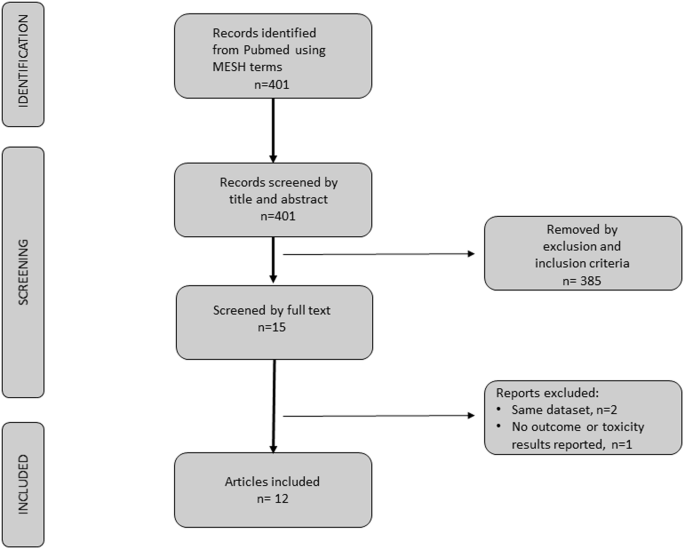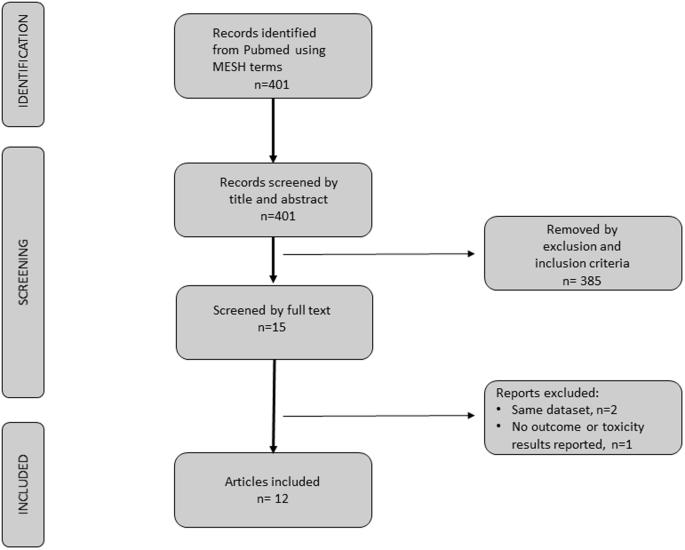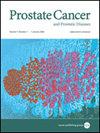Role of enzalutamide in primary and recurrent non-metastatic hormone sensitive prostate cancer: a systematic review of prospective clinical trials
IF 5.1
2区 医学
Q1 ONCOLOGY
引用次数: 0
Abstract
Enzalutamide, a second-generation androgen receptor inhibitor, is indicated for the treatment of metastatic disease, as well as in the treatment of non-metastatic castration resistant prostate cancer (PCa). This systematic review aims to determine outcomes and toxicity in patients with non-metastatic castration sensitive prostate cancer (nmCSPC) treated with enzalutamide in the primary or salvage settings. We performed a systematic review focusing on the role of Enzalutamide in the treatment of nmCSPC, using the PubMed/Medline database. Articles focusing on androgen receptor inhibitors in nmCSPC were included, while articles discussing exclusively metastatic or castration-resistant PCa were excluded. The initial search retrieved 401 articles, of which 15 underwent a thorough assessment for relevance. Ultimately, 12 studies with pertinent outcomes were meticulously examined. Among these, seven studies were dedicated to the investigation of enzalutamide in the primary setting, while the remaining five publications specifically addressed its use in salvage settings. Regardless of the treatment setting, our data revealed two distinct therapeutic strategies. The first advocates for the substitution of enzalutamide for androgen deprivation therapy (ADT), based on the premise of achieving equivalent, if not superior, oncological outcomes while minimizing treatment-related toxicity. The second, adopting a more conventional approach, entails augmenting the effectiveness of ADT by incorporating enzalutamide. Enzalutamide has considerable potential as a therapeutic strategy for nmCSPC, either used alone or in combination with ADT in the primary or in the salvage settings. The use of enzalutamide instead of ADT is an appealing strategy. However, more trials will be required to further understand the efficacy and side-effect profile of enzalutamide monotherapy.


恩杂鲁胺在原发性和复发性非转移性激素敏感性前列腺癌中的作用:前瞻性临床试验的系统回顾
简介恩杂鲁胺是第二代雄激素受体抑制剂,适用于治疗转移性疾病以及非转移性去势抵抗性前列腺癌(PCa)。本系统性综述旨在确定接受恩杂鲁胺治疗的非转移性阉割敏感性前列腺癌(nmCSPC)患者在初治或抢救治疗中的疗效和毒性。结果初步检索到401篇文章,对其中15篇文章的相关性进行了全面评估。最终,对 12 项具有相关结果的研究进行了仔细审查。在这些研究中,有七项研究专门针对恩杂鲁胺在初治环境中的应用进行了调查,而其余五项研究则专门针对恩杂鲁胺在抢救环境中的应用进行了调查。无论治疗环境如何,我们的数据揭示了两种截然不同的治疗策略。第一种策略主张用恩杂鲁胺替代雄激素剥夺疗法(ADT),其前提是在最大程度降低治疗相关毒性的同时获得同等甚至更好的肿瘤治疗效果。结论恩杂鲁胺作为nmCSPC的治疗策略具有相当大的潜力,无论是单独使用还是与ADT联合使用,都可用于初治或挽救治疗。使用恩杂鲁胺替代ADT是一种很有吸引力的策略。然而,要进一步了解恩杂鲁胺单药治疗的疗效和副作用,还需要进行更多的试验。
本文章由计算机程序翻译,如有差异,请以英文原文为准。
求助全文
约1分钟内获得全文
求助全文
来源期刊

Prostate Cancer and Prostatic Diseases
医学-泌尿学与肾脏学
CiteScore
10.00
自引率
6.20%
发文量
142
审稿时长
6-12 weeks
期刊介绍:
Prostate Cancer and Prostatic Diseases covers all aspects of prostatic diseases, in particular prostate cancer, the subject of intensive basic and clinical research world-wide. The journal also reports on exciting new developments being made in diagnosis, surgery, radiotherapy, drug discovery and medical management.
Prostate Cancer and Prostatic Diseases is of interest to surgeons, oncologists and clinicians treating patients and to those involved in research into diseases of the prostate. The journal covers the three main areas - prostate cancer, male LUTS and prostatitis.
Prostate Cancer and Prostatic Diseases publishes original research articles, reviews, topical comment and critical appraisals of scientific meetings and the latest books. The journal also contains a calendar of forthcoming scientific meetings. The Editors and a distinguished Editorial Board ensure that submitted articles receive fast and efficient attention and are refereed to the highest possible scientific standard. A fast track system is available for topical articles of particular significance.
 求助内容:
求助内容: 应助结果提醒方式:
应助结果提醒方式:


